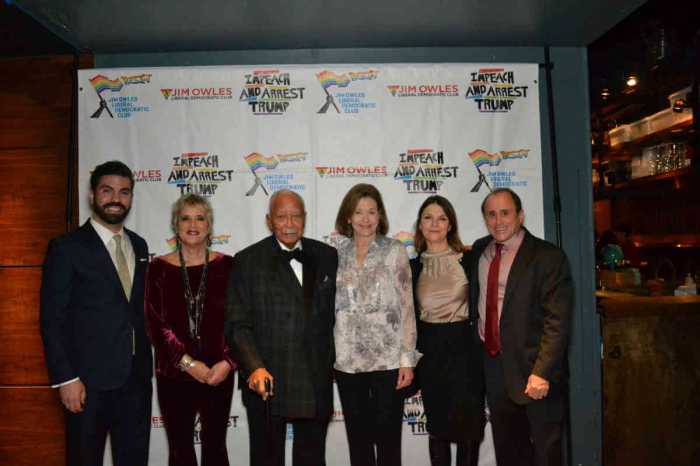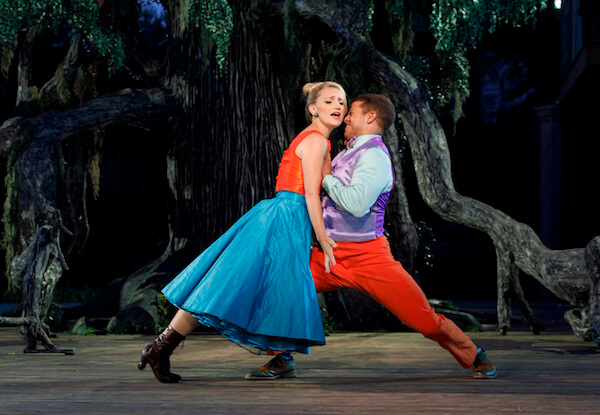Anthony Crivello and Seth Numrich in Lincoln Center Theater’s production of Clifford Odets’ “Golden Boy,” running at the Belasco Theatre through January 20. | PAUL KOLNIK
The term “angry young man” is generally attributed to working class British playwrights in the 1950s and ‘60s, but perhaps no other drama embodies the concept more fervently than “Golden Boy,” written by Clifford Odets in New York in 1937. Proof positive that the influential Odets was well before his time. He is timeless, as well.
Joe Bonaparte (Seth Numrich), the titular boy, gets mighty angry. As the youngest son of an Italian immigrant, he was a geeky, cock-eyed kid — a “shrimp with glasses” and a weird name that made him a social outcast who got bullied. He found solace studying the violin and support from his sensitive, music-loving father (Tony Shalhoub), yet on the eve of his 21st birthday he discovers he has another talent — boxing. The nimble lightweight has an edge over other prizefighters — instead of relying solely on brawn, he uses his brains.
As for his fists, well, he initially uses them sparingly in order to protect them from serious damage so he might one day go back to his first love.
Torn between a career in music and boxing, Joe chooses the more manly, lucrative path, egged on by his opportunistic manager Tom Moody (Danny Mastrogiorgio), his devoted trainer Tokio (Danny Burstein, from “Follies” and “South Pacific”), and, later, a ruthless mentor, Eddie (Anthony Crivello), who is seen as a threat by the syndicate that handles Joe despite his veiled homosexuality. Along the way, Joe falls hard for Moody’s girl, Lorna (portrayed with complex intensity by Yvonne Strahovski), a bleach-blonde “tramp from Newark” who’s got an axe of her own to grind.
Once the prizefighter tastes blood, he becomes a veritable vampire, wrecking relationships as he goes out for more. But can he ever satisfy his thirst?
“Do not violate the laws of nature if you do not want to be miserable,” says the elder Bonaparte. Joe admits fighting is not in his nature and that he is indeed miserable. But he bounds ahead and pays the price.
This “Golden Boy” has received a richly textured, gut-wrenching production from Lincoln Center Theater, tapping the clear-eyed Bartlett Sher, who directed another Odets gem, “Awake and Sing!,” winner of the 2006 Tony Award for Best Play Revival. Aided by Michael Yeargan’s moody urban exteriors and gritty gym interiors and Catherine Zuber’s period-perfect costumes (she did painstaking research to get the boxing garb just right), the 19-actor ensemble exquisitely evokes Depression-era New York.
Seth Numrich and Danny Burstein in “Golden Boy.” | PAUL KOLNIK
As the betrayed boxer, chiseled pretty boy Numrich is astonishing, morphing convincingly from awkwardly defiant son to bloodthirsty monster. The 25-year-old, Julliard-trained actor most recently starred in “War Horse,” but just three years ago he was playing a tortured gay teen in a tiny play titled “Slipping” at the Rattlestick, opposite Adam Driver.
My only quibble is that the play sometimes feels like a pulpy film noir of that era, and a few characters, with their dated New York vernacular, verge on cardboard cutouts. “His mitts are on his mind,” says Moody. “You can’t do a thing with a nut like that.” But overall the performances are so strong it doesn’t matter.
For his part, Sher keeps the action churning in this three-act play, which clocks in at just under three hours with two intermissions. He seems especially keen showing as many fleshy boxing champs as possible, at both their fiercest and most vulnerable. The sight of the sobbing, shuddering golden boy on the rubdown table, being soothed by his trainer, is one of the most tenderly harrowing moments you’ll see on the boards this season.
This blistering, first-rate production of “Golden Boy” is a testament to the durable power of Odets, who may have modeled the material on his own conflicts as an angry young man. Surely the themes of choosing fame and fortune over art, staying true to your nature, and avenging bullies resonate just as clearly today.
How fitting that the drama is being staged at the Belasco Theatre, where it premiered with Frances Farmer and Elia Kazan 75 years ago.
GOLDEN BOY | Belasco Theatre | Produced by Lincoln Center | 111 W. 44th St. | Tue. at 7 p.m.; Wed.-Sat. at 8 p.m.; Wed., Sat. at 2 p.m.; Sun. at 3 p.m., through Jan. 20 | $37-$127 | lct.org

































